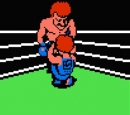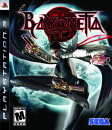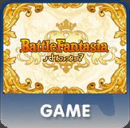http://rpgland.com/games/reviews/final-fantasy-xiii-japanese/

Coming three years after the last main-series Final Fantasy title, Final Fantasy XIII is overall solidly built and has a lot of great things going for it. Though the end credits declare “thanks to all fans of Final Fantasy,” it also has some departures from tradition that are bound to anger a lot of long-time devotees. These innovations are designed to keep the product fast-paced and cinematic, but what they sacrifice hurts as well as helps. Despite some poor design decisions, though, Final Fantasy XIII is worth playing, even if it isn’t a must-play.
Final Fantasy XIII’s crown jewel is its battle system, which is speedy, challenging (moreso later on), and even offers some coveted boss battle adrenaline. A new ATB system is in place, with the bar split into sections that are each worth a point, and abilities consuming a certain amount of points. A full bar is not necessary for attacking, and players can use as many points at a time as they see fit, as well as cancel or execute attacks on the fly. On the battlefield, three party members face off against enemies (sometimes up to nine or ten at a time) armed with an assigned Role: Attacker, Blaster, Defender, Jammer, Enhancer, or Healer. Each one is highly specialized and only will perform a very strict set of actions. For example, Blasters use elemental attacks exclusively, Jammers debuff foes, and Healers will spam Cure spells perpetually. Every character starts with a few Roles, but can eventually use all six. One character is controlled by the player, and the others by all-around excellent AI. During battle, the party must fall into one of up to six Optimas–configurations of the different party roles, like Attacker-Enhancer-Healer or Blaster-Attacker-Defender–that are tailored by the player. Optimas may be switched at any time in battle with no penalty.
 |
| [Token Sphere Grid COmparison] |
Optimas are built to encourage switching as often as possible, and in fact the wait between the ATB bar filling can sometimes be circumvented by switching Optimas at just the right moment, allowing for many attacks in less time than just picking one Optima and sticking with it. Many attacks in short succession are the key to victory in Final Fantasy XIII due to the Chain meter, which each foe has and which increases with each attack, but decreases over time without repeated hits. When the Chain meter fills, the enemy enters a temporary Break state, where it often won’t attack, will take significantly more damage, and can be juggled in the air to immobilize it. Filling the Chain meter is often the only way to beat some foes, and forces players to balance between different roles: Attackers and Blasters will do comparable damage, but Attackers fill the Chain meter slower and reduce the speed that it decreases, while Blasters fill the meter quickly but must attack more times, lest the meter completely empty during the downtime.
The system sounds confusing, and isn’t fully realized until a few hours into the game, but once each character has at least two Roles, it hits a sweet spot. Battles are fast but feel totally controllable. As Summoning is introduced, it adds a new element of strategy since Eidolons are over-the-top flashy and not particularly powerful, but summoning and dismissing them heals the party completely. Summoning, like other Tactical abilities, consume points that require many battles to build up, so they have to be spent wisely. The difficulty of the game ramps up halfway through, and forces the player to attack battles with different strategies: having a Healer constantly on board might not be the lifesaver one thinks it is, as having three characters wailing on the enemies to reduce damage taken overall could be better, or having a Defender tanking while other characters set buffs and debuffs in place. The system is nearly perfect, though it has a few irritating pieces like getting Game Overs when the leader goes down, even though two healthy party members could revive her in a few seconds. The optional action that lets the AI stock the leader’s ATB bar is an especially nice touch in a tough spot.
 |
| I wonder where Lightning got her name… |
To get it out of the way, plenty of the “shocking” rumors making rounds about Final Fantasy XIII are true: there are no towns in the conventional sense, and the first half of the game is very linear. How these affect the game might be different from what one expects, though, so it’s important to take them all in context. The battle system is great, so carries the game through the linear moments in a way nothing else could. Later on in the game, a wealth of extra monster hunting missions open up, and some extra areas become available too. Keeping the game as linear as it is, while a design decision that hurts the experience for players with a deep hunger to take off on their own, is designed to aid the story and keep it moving quickly. The linearity kills most of the replay value for the game, unfortunately. Gameplay normally reserved for towns, like shops or upgrading items, has been relegated to save points, so there isn’t a lack of features. What eliminating towns and limiting early exploration time for the player does is hurt the story just as much, if not more than the gameplay. A significant amount of gameplay changes have been made to facilitate the story, so it’s unfortunate that the story drops the ball with all the resources given to it.
The concepts of the story sound fantastic on paper: Final Fantasy XIII’s world is one of dualities, as two worlds and two different kinds of beings are pitted against each other. Floating high in the sky is the high-tech world of Cocoon; below is the primeval wilderness, Gran Pulse. Each is inhabited by humans, and powerful beings called fal’Cie. Citizens of Cocoon are convinced that Pulse is nothing short of hellish, and even minor exposure to it is dangerous. fal’Cie sometimes choose humans to represent them, called l’Cie, who receive great power and in return have a purpose, or Focus, that they must fulfill. If they fail to complete their Focus, they turn into monsters called Cie Corpses; if they succeed, they are immortalized as crystals instead. Naturally, the whole cast of playable characters falls prey to this lose-lose appointment to l’Cie at the hands of a Pulse fal’Cie. Most have lives they want to live, people they want to be with, or things they want to do that don’t involve being a puppet for an aloof magical being, but instead must deal with trying to find their Focus and complete it while being hunted by the merciless Sanctum, the government of Cocoon bent on eliminating all Pulse-related things from its utopia. All the pieces are in place to deliver a fantastic tale.
 |
| “Well we’ll just chase these little things up to the OH DEAR GREAT BUDDAH IN HEAVEN!” |
In practice, however, the way the story is presented involves far more “tell” than “show.” The plot itself had great potential, and is supported by a wealth of in-menu encyclopedic information, but it is corrupted by mundane dialogue and a style of delivery that sacrifices gradual and subtle characterizations for large, self-indulgent cinematics. Since the game moves along at a fast, controlled clip to keep the high-energy vibe rolling, it loses players the opportunity to really be immersed in the world and the minds of the characters. The script has obviously been written for a manga-digesting audience, so gaps to insert something meaningful are instead filled with “Let’s go!” and “We just have to believe!” Rather than truly pondering why they fight, characters banter around concepts like “fighting” and “hope” and “believing” and appear to merely be going through the rote motions of establishing personal philosophies during dialogue banters.
Snow is the worst perpetrator of script assassination, and though there are chances at legitimate characterization, the player is merely informed about Snow’s personality in an offhand manner and then subjected to his “I want to be the Hero!” speeches. Every character has some annoying stereotype that they fall back into in their dialogue, rather than developing naturally. Some can stand up despite the bad script, like Sazh and Fang. Others, like Hope, cannot. It’s a crying shame, because the times when subtle characterization appears (aided by the facial graphics that can be startlingly realistic), it is very well done, like Sazh’s response to Hope’s comments about his father early in the game. Overall, if the encyclopedia material and prequel novel material had been worked into the actual game, and the dialogue injected with meaning, Final Fantasy XIII could have had one epic plot. But considering how much game energy is invested in the story, the results are disappointing.
 |
| Ooooh, shiny! |
Final Fantasy XIII’s visuals take the series to a whole new level, not just because of high production values and epic shine, but because of the impact they have on other aspects of the game. Despite detailed character and monster models and large, graphically challenging maps, the game’s load times are kept to a bare minimum. The characters themselves have very expressive faces, especially with small eye movements that are subtle and natural, and close mouth-dialogue matching that makes it in a few cases possible to read their lips, all of which improve story sequences immensely. While jokes about low-res grass textures abound online, it’s harder to poke fun at what must be some of the most beautifully rendered skies in a game. Animation of characters and monsters is also excellent — the mannerisms for some characters are rather Japanese, but match undeniably well.
What’s really satisfying about Final Fantasy XIII is all of the small details packed into the game: visually, in the interface, and in the story sequences. Some of the larger decisions about the story, pacing, or linearity might be questionable, but the little things prove that everything was thought about and cared about (even if those larger decisions were a gamble). It’s hard to describe exactly what all of the details are, but it’s the small touches that make it feel like the developers cared about making the game memorable, and free of awkwardness. Things like the ally battle AI adapting as the player learns about enemies, rather than the AI automatically knowing what the monsters are weak against or worse, continuing to use abilities that the player knows are ineffective. Or characters talking as they run around, and remarking when they see something strange rather than mutely ignoring a totally obvious out-of-place figure in the distance (remember that old cliche?). Or the fact that characters in the background of cinemas don’t stand around like they’re in the background, but react and smile or flinch or converse. Or looking down from a high place and seeing the lower reaches of a town looking absolutely identical to when the group traveled them earlier. It’s a frustratingly nebulous observation to try and make, but the details just feel good.
Another bright spot in Final Fantasy XIII is the sound effects and voices, which are all well done. The ambient sound effects in particular are great, as well as the in-battle sound effects of magic and monsters. A slightly less bright and shiny point is the music, which is usually good, but a little repetitive. Some of the best music tracks are the jazz or bossa nova flavored ones, and Masashi Hamauzu deserves huge credit for using a wide variety of instruments, ranging from trombone to the Jew’s Harp. A lot of J-poppy vocals are used in background music tracks, which isn’t always bad, but definitely can be, especially when the lyrics are English ones about rainbows, or chirping “We will have fun!” The problem with pop influences is that while they aren’t necessarily bad, they aren’t timeless. While the orchestral stuff is great, anything with a pop vibe will be completely forgettable.

Final Fantasy XIII is going to be remembered by many for what it isn’t and what it doesn’t do. The game as a whole is worth playing, carried by its excellent battle system, engrossing visuals, unique style, and excellent all-around attention to detail. Its attempt to streamline the RPG experience to make way for a cinematic, story-driven experience is probably going to be looked down upon, especially since the story itself suffers from missteps. Players who can not let go of the fact that Final Fantasy XIII removes certain RPG conventions are going to have a rough hurdle to get over to enjoy the game. Players who are willing to let watery manga-esque stories and linearity slide are going to be free to enjoy the game’s high points, which are very high indeed.
-Janelle Hindman
| Score Breakdown | ||
| Overall Very Good Out of 10 See our Review Criteria |
Gameplay | Great |
| Story | Below Average | |
| Graphics | Excellent | |
| Sound/Music | Very Good | |
| Replay Value | Bad | |
| The Verdict: Seven |


























































